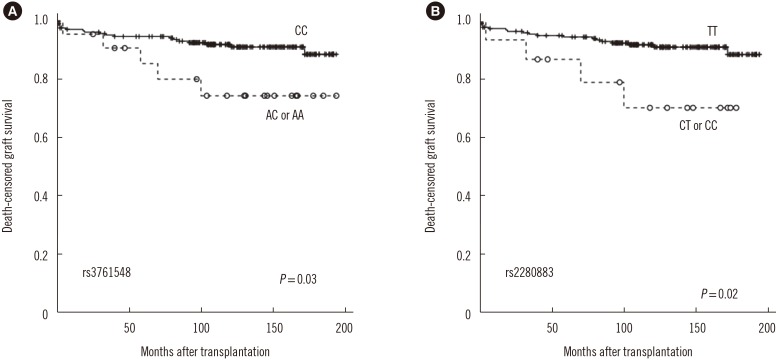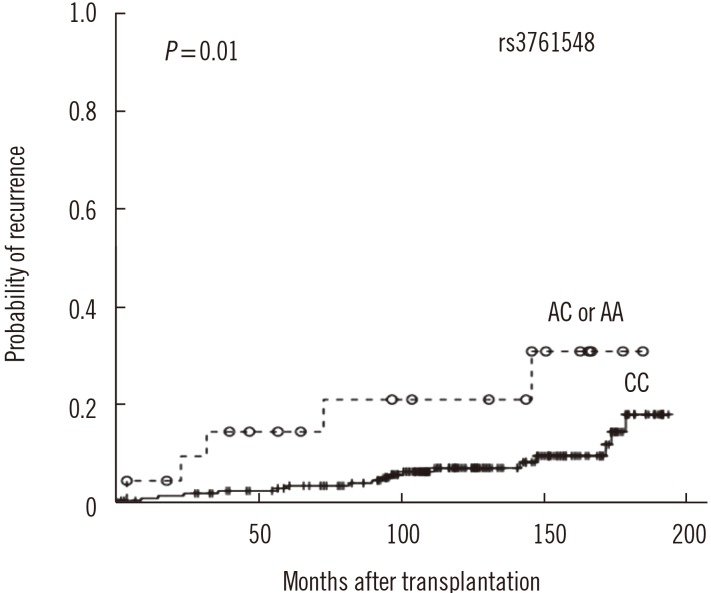Ann Lab Med.
2017 Sep;37(5):420-425. 10.3343/alm.2017.37.5.420.
Association of Foxp3 Polymorphism With Allograft Outcome in Kidney Transplantation
- Affiliations
-
- 1Department of Laboratory Medicine, Seoul National University College of Medicine, Seoul, Korea. eysong1@snu.ac.kr
- 2Department of Laboratory Medicine, Seegene Medical Foundation, Seoul, Korea.
- 3Transplantation Center, Seoul National University Hospital, Transplantation Research Institute, Seoul National University College of Medicine, Seoul, Korea.
- KMID: 2383918
- DOI: http://doi.org/10.3343/alm.2017.37.5.420
Abstract
- BACKGROUND
Forkhead box P3 (Foxp3) is the most reliable marker for regulatory T cells, which play an important role in maintaining renal allograft tolerance. Recently, Foxp3 polymorphisms have been reported to be associated with graft outcome in kidney transplantation. We analyzed the association of Foxp3 polymorphisms with renal allograft outcome.
METHODS
Foxp3 polymorphisms (rs3761548 A/C, rs2280883 C/T, rs5902434 del/ATT, and rs2232365 A/G) were tested by PCR with sequence-specific primers (PCR-SSP) in 231 adult kidney transplantation recipients from 1996-2004 at Seoul National University Hospital.
RESULTS
Patients with the rs3761548 CC genotype showed better graft survival than those with the AC or AA genotype (log rank test, P=0.03). Patients with the rs3761548 CC genotype also showed a lower rate of recurrence of the original glomerular disease than those with the AC or AA genotype (P=0.01). The frequency of acute rejection (AR) in patients with the rs2280883 TT genotype was lower than that in patients with the rs2280883 CT or CC genotype (26.9% vs 53.3%, P=0.038). Patients with the rs2280883 TT genotype also showed better graft survival than those with the CT or CC genotype (P=0.03).
CONCLUSIONS
Foxp3 rs3761548 CC and rs2280883 TT genotypes were associated with superior graft outcome of kidney transplantation. Further studies involving a larger number of patients are needed.
MeSH Terms
Figure
Reference
-
1. Yates PJ, Nicholson ML. The aetiology and pathogenesis of chronic allograft nephropathy. Transpl Immunol. 2006; 16:148–157. PMID: 17138047.2. Zheng XX, Sánchez-Fueyo A, Sho M, Domenig C, Sayegh MH, Strom TB. Favorably tipping the balance between cytopathic and regulatory T cells to create transplantation tolerance. Immunity. 2003; 19:503–514. PMID: 14563315.3. Li XC, Turka LA. An update on regulatory T cells in transplant tolerance and rejection. Nat Rev Nephrol. 2010; 6:577–583. PMID: 20683480.4. Graca L, Cobbold SP, Waldmann H. Identification of regulatory T cells in tolerated allografts. J Exp Med. 2002; 195:1641–1646. PMID: 12070291.5. Nagahama K, Nishimura E, Sakaguchi S. Induction of tolerance by adoptive transfer of Treg cells. Methods Mol Biol. 2007; 380:431–442. PMID: 17876110.6. Fontenot JD, Gavin MA, Rudensky AY. Foxp3 programs the development and function of CD4+CD25+ regulatory T cells. Nat Immunol. 2003; 4:330–336. PMID: 12612578.7. Oda JM, Hirata BK, Guembarovski RL, Watanabe MA. Genetic polymorphism in FOXP3 gene: imbalance in regulatory T-cell role and development of human diseases. J Genet. 2013; 92:163–171. PMID: 23640423.8. He Y, Na H, Li Y, Qiu Z, Li W. Foxp3 rs3761548 polymorphism predicts autoimmune disease susceptibility: a meta-analysis. Hum Immunol. 2013; 74:1665–1671. PMID: 23993983.9. Bestard O, Cruzado JM, Rama I, Torras J, Gomà M, Serón D, et al. Presence of FoxP3+ regulatory T cells predicts outcome of subclinical rejection of renal allografts. J Am Soc Nephrol. 2008; 19:2020–2026. PMID: 18495961.10. Grimbert P, Mansour H, Desvaux D, Roudot-Thoraval F, Audard V, Dahan K, et al. The regulatory/cytotoxic graft-infiltrating T cells differentiate renal allograft borderline change from acute rejection. Transplantation. 2007; 83:341–346. PMID: 17297410.11. Mansour H, Homs S, Desvaux D, Badoual C, Dahan K, Matignon M, et al. Intragraft levels of Foxp3 mRNA predict progression in renal transplants with borderline change. J Am Soc Nephrol. 2008; 19:2277–2281. PMID: 18667728.12. Krepsova E, Tycova I, Sekekova A, Wohlfahrt P, Hruba P, Striz I, et al. Effect of induction therapy on the expression of molecular markers associated with rejection and tolerance. BMC Nephrol. 2015; 16:146. PMID: 26286066.13. Iwase H, Kobayashi T, Kodera Y, Miwa Y, Kuzuya T, Iwasaki K, et al. Clinical significance of regulatory T-cell-related gene expression in peripheral blood after renal transplantation. Transplantation. 2011; 91:191–198. PMID: 21157405.14. Muthukumar T, Dadhania D, Ding R, Snopkowski C, Naqvi R, Lee JB, et al. Messenger RNA for FOXP3 in the urine of renal-allograft recipients. N Engl J Med. 2005; 353:2342–2351. PMID: 16319383.15. Veronese F, Rotman S, Smith RN, Pelle TD, Farrell ML, Kawai T, et al. Pathological and clinical correlates of FOXP3+ cells in renal allografts during acute rejection. Am J Transplant. 2007; 7:914–922. PMID: 17286616.16. Qiu XY, Jiao Z, Zhang M, Chen JP, Shi XJ, Zhong MK. Genetic association of FOXP3 gene polymorphisms with allograft rejection in renal transplant patients. Nephrology (Carlton). 2012; 17:423–430. PMID: 22239151.17. Engela AU, Boer K, Roodnat JI, Peeters AM, Eilers PH, Kal-van Gestel JA, et al. Genetic variants of FOXP3 influence graft survival in kidney transplant patients. Hum Immunol. 2013; 74:751–757. PMID: 23459079.18. Misra MK, Mishra A, Pandey SK, Kapoor R, Sharma RK, Agrawal S. Association of functional genetic variants of transcription factor Forkhead Box P3 and Nuclear Factor-κB with end-stage renal disease and renal allograft outcome. Gene. 2016; 581:57–65. PMID: 26794449.19. Song EY, Park MH, Kang SJ, Park HJ, Kim BC, Tokunaga K, et al. HLA class II allele and haplotype frequencies in Koreans based on 107 families. Tissue Antigens. 2002; 59:475–486. PMID: 12445317.20. Chen X, Gan T, Liao Z, Chen S, Xiao J. Foxp3 (-/ATT) polymorphism contributes to the susceptibility of preeclampsia. PLoS One. 2013; 8:e59696. PMID: 23560055.21. Gao L, Li K, Li F, Li H, Liu L, Wang L, et al. Polymorphisms in the FOXP3 gene in Han Chinese psoriasis patients. J Dermatol Sci. 2010; 57:51–56. PMID: 19880293.22. Wu Z, You Z, Zhang C, Li Z, Su X, Zhang X, et al. Association between functional polymorphisms of Foxp3 gene and the occurrence of unexplained recurrent spontaneous abortion in a Chinese Han population. Clin Dev Immunol. 2012; 2012:896458. PMID: 21876709.23. Inoue N, Watanabe M, Morita M, Tomizawa R, Akamizu T, Tatsumi K, et al. Association of functional polymorphisms related to the transcriptional level of FOXP3 with prognosis of autoimmune thyroid diseases. Clin Exp Immunol. 2010; 162:402–406. PMID: 20942809.24. Hoogendoorn B, Coleman SL, Guy CA, Smith K, Bowen T, Buckland PR, et al. Functional analysis of human promoter polymorphisms. Hum Mol Genet. 2003; 12:2249–2254. PMID: 12915441.25. Coppo R, Amore A, Chiesa M, Lombardo F, Cirina P, Andrulli S, et al. Serological and genetic factors in early recurrence of IgA nephropathy after renal transplantation. Clin Transplant. 2007; 21:728–737. PMID: 17988266.26. André GM, Barbosa CP, Teles JS, Vilarino FL, Christofolini DM, Bianco B. Analysis of FOXP3 polymorphisms in infertile women with and without endometriosis. Fertil Steril. 2011; 95:2223–2227. PMID: 21481380.27. Zheng L, Wang X, Xu L, Wang N, Cai P, Liang T, et al. Foxp3 gene polymorphisms and haplotypes associate with susceptibility of Graves' disease in Chinese Han population. Int Immunopharmacol. 2015; 25:425–431. PMID: 25708657.28. Owen CJ, Eden JA, Jennings CE, Wilson V, Cheetham TD, Pearce SH. Genetic association studies of the FOXP3 gene in Graves' disease and autoimmune Addison's disease in the United Kingdom population. J Mol Endocrinol. 2006; 37:97–104. PMID: 16901927.29. Eastell T, Hinks A, Thomson W. BSPAR Study Group. SNPs in the FOXP3 gene region show no association with Juvenile Idiopathic Arthritis in a UK Caucasian population. Rheumatology (Oxford). 2007; 46:1263–1265. PMID: 17526924.30. Fadel FI, Elshamaa MF, Salah A, Nabhan M, Rasheed M, Kamel S, et al. Fas/Fas Ligand pathways gene polymorphisms in pediatric renal allograft rejection. Transpl Immunol. 2016; 37:28–34. PMID: 27109035.31. Park H, Shin S, Park MH, Kim YS, Ahn C, Ha J, et al. Association of IL-17F gene polymorphisms with renal transplantation outcome. Transplant Proc. 2014; 46:121–123. PMID: 24507036.
- Full Text Links
- Actions
-
Cited
- CITED
-
- Close
- Share
- Similar articles
-
- Allograft Immune Reaction of Kidney Transplantation: Part 1. Mechanism of Allograft Rejection
- Association of Polymorphisms in the IL-10 and IFN-gamma Genes with Allograft Dysfunction Following Kidney Transplantation in Koreans
- FAS-670A>G gene polymorphism and the risk of allograft rejection after organ transplantation: a systematic review and meta-analysis
- A Retrospective Analysis on Reasons for Allograft Nephrectomy after Kidney Transplantation
- Clinical significance of Th17 cells in kidney transplantation



